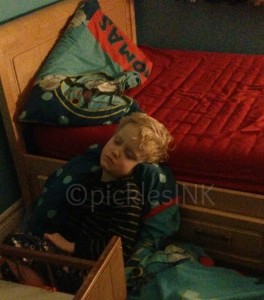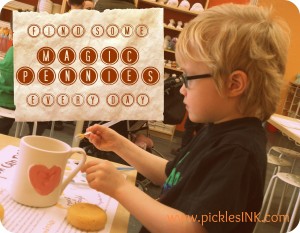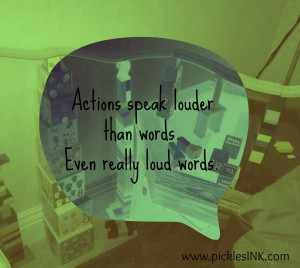I did some really great parenting yesterday.
It was that kind of day, you know? The kind that starts out tough and just gets tougher; the sort of day that has potential to go, as Ian would say in British, “completely pear-shaped.” Not to mention that with a new job and the mindbogglingly stressful and emotionally taxing somewhat time-consuming responsibilities that I’ve taken on at church battling my regular day-to-day tasks for ultimate supremacy, my time is at a premium and sleep a distant memory, so patience-wise, I’m not exactly at my best.
The kids were way overtired from the minute they woke up – as demonstrated by the fact that they were bickering, yelling, and at each other’s throats from the moment they rolled out of the wrong side of their beds.

This is what ‘overtired’ looks like.
Ben had a PD Day, and our plan was to drop Molly off at her school and then spend a special “Mommy and Ben morning” painting pottery at Crock-A-Doodle, but by 9:30 he was neck-deep in Meltdown #3 (“NO I WILL NOT HAVE MY TALONS NAILS CLIPPED BEFORE WE GO YOU CAN’T MAKE ME NO NO NOOOOOOOOOO I WON’T I WON’T I WON’T!!!!”) and I was thinking, “This just ain’t going to end well.”
But I stayed calm. He yelled…and I stayed calm. He screamed…and I stayed calm. He flailed…and I still stayed calm. Finally he settled down enough to have his nails clipped, requested tickles to cheer him up, and then we left.
And that was Great Parenting Moment #1.
We painted at Crock-A-Doodle for almost two hours – long enough that we lost track of time and had a panicked race to finish so we could pick Molly up on time. We painted AMAZING masterpieces together – I wish I could go back in time and do it over and over again because it was the most incredible, wonderful bonding time I’ve had with Ben ever. (Pictures of the masterpieces will follow in a few days when we pick them up!)

Masterpieces, pre-firing.
There was no anxiety over perfectionism on either of our parts (a trait we both have in spades!) – just a fun, creative time together, sharing ideas, and complimenting each other’s work (“Mommy, I love your under the sea mug. I think it’s the most beautiful thing you’ve ever made. And I love my heart mug for daddy – It’s going to be so amazing.”) Ben has a tendency to be hypercritical of himself, especially when it comes to art, so to hear him so pleased with himself was wonderfully refreshing.
I guess that was Great Parenting Moment #2, though Ben deserves at least half the credit!

…and all the credit for his masterpiece! Text reads “Find some magic pennies every day”.
We picked Molly up, ate lunch, and then they went to play MarioKart. Soon the overtiredeness reared its ugly head again as they launched back into bicker-yell-grab-hysterics-yell-bicker mode. As it devolved into screaming with no apparent cause or solution I walked into the room and – again calmly – turned off the TV, took the controllers away, and marched them upstairs.
Usually at this point in a day like this, I would be overcome with frustration and, if not yelling, certainly close to it (you know the tone – gritted teeth and rapid-fire punctuation – “Get. Up. Stairs.”), and Ben and Molly know it. But this time I was still completely Zen. I wasn’t angry, just focused giving them both some space from each other and from me. And were they ever confused – you could tell that they were expecting some sort of lecture and punishment.
I put them in their rooms and spoke to them one at a time – “Are we having nap? Are we in time-out?” “You are having some quiet time. You need to stay in your room. You can look at books and read or play quietly. Don’t leave your room – don’t talk to Molly/Ben – don’t yell down and ask me if it’s done. I’ll come and get you when you’re finished.” And then I went back downstairs, feeling relieved – not because I wasn’t going to have to listen to them screeching, but because they both finally seemed to be having a breather and getting the quiet and space that they needed to settle down.
And that was Great Parenting Moment #3.
Later in the day, Molly wanted to watch Beauty and the Beast, and Ben objected strenuously. Again the tiredness came out (unfortunately the quiet time couldn’t quite solve that issue!) and he started yelling in rapid-fire bursts, “NO!” “I WON’T!” “I DON’T WANT TO!” His tantrum culminated in his approaching me and Molly, saying (seemingly calmly), “Can I tell you something?” and then screaming into my waiting ear, “IT’S TOO SCARY!”
Boy oh boy…on any other day, I would have Hit. The. Roof. He had deliberately set me up; my ears were ringing; and I was furious. How Dare He? But from somewhere deep inside a little voice said, “breathe,” and I did. And I looked my little boy in the eyes – eyes that looked shocked and scared, anticipating my reaction – and I said, “Ben, go and sit on the step, please.” And that was Great Parenting Moment #4.
I set up the movie for Molly, took a few deep breaths, and then went to talk to Ben. First we talked how I was upset because he had made me think he was just going to say something and then screamed, and it hurt both my ear and my feelings. And then we talked about the yelling and screaming in general and why he did it and how he was going to stop doing it. He said, “I do it when I’m FRUSTRATED.” I asked if he screams at school and he said no. I asked if he gets frustrated at school, and he said yes. I asked why, if he still gets frustrated at school, doesn’t he scream there, but he does at home.
He thought for a minute and then answered in that astoundingly astute Ben way
I guess it’s because at home I know you love me and you’ll keep loving me when I scream but at school they don’t have to.
And I hugged him harder than ever, and that was Great Parenting Moment #5.

Special ‘Mommy and Ben Day’ at Crock-A-Doodle!
I might not be the greatest parent in the world. But I have my moments. And I think they’re a little like that magic penny – the more of those moments I can make, and the more I recognize them and remember them, the more I can build on them. And the more Ben and Molly will come to expect them and appreciate them and one day have their own.
~ karyn
Do you find it hard to keep your temper when your kids are overtired? What do you do to keep from yelling? Do you remember to give yourself a pat on the back when you get it right?

